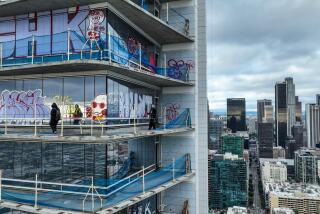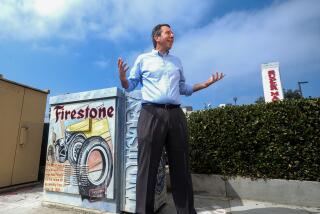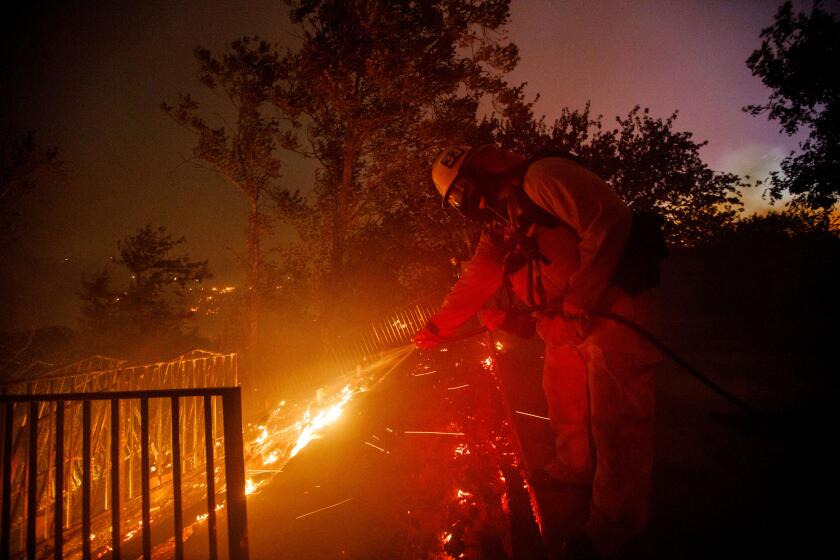Tim Rutten: Rick Caruso’s grand plan
Some years ago, I attended the funeral of a friend’s mother at a Los Angeles cemetery so singular that it once was the target of a famous literary satire. Since the family was indifferent to religion, they availed themselves of the facility’s nondenominational chapel, where a vague sort of nondenominational service was conducted by a nondenominational clergyman provided by the cemetery.
All I recall from his homily that day is that he repeatedly referred to God as “the developer of the universe.”
It was one of those only-in-L.A. moments because this probably is the only major city in the world where “the developer” not only is a recognizable — even heroic — archetype, but also sits at the center of our civic cosmology.
All this comes to mind because one of the candidates in the next mayoral election may be billionaire developer Rick Caruso, who owns — among other things —the Encino Marketplace, the Americana at Brand in Glendale, the Grove and Burton Place Retail Center in Los Angeles.
Caruso deserves full marks for being the only potential candidate so far to deliver both a critique of the city’s current failings and also a vision of what potential remedies might entail. Moreover, he forthrightly says that his perspective is that of a developer.
In a recent Town Hall address, he recalled that “more than a century ago, a wild-eyed dreamer by the name of ‘Lucky’ Baldwin came to Southern California to speculate in land. He bought some large parcels across the region, which he divided and sold off to people in the East.” Men like Baldwin, Caruso went on to say, were “visionaries who saw here the opportunity to build something new.”
Elias Jackson Baldwin was a lot of things, but “visionary” in the sense he imagined a future Los Angeles is a stretch. Baldwin came to L.A. in 1875 as one of the most successful silver speculators of the Comstock era. He thought agriculture was the coming thing and purchased Rancho Santa Anita. When the bottom fell out of farm prices a decade later, he began subdividing parts of his holdings. Santa Anita Race Track is his lasting legacy.
Last week, Caruso spoke to a San Fernando Valley audience and repeated not only his familiar critiques — opposition to the subway, a desire to break up the Los Angeles Unified School District, a call to abolish the gross receipts tax — but also a sketch of the city’s future as he envisions it. Speaking from “the developer’s point of view on how to make Los Angeles more livable,” he envisioned neighborhoods each organized around its own shopping center, all of which would be connected by an above-ground light-rail system.
Street-level transit by trolley — as in the Grove — is one of Caruso’s keys to livability. “If you build an engaging, interesting transportation system in Los Angeles, at the street level, where people can get off and walk Ventura Boulevard, shop, get back on, go grab a bite, get back on, connect to their car and then get home, or vice versa, all of a sudden, you’re serving that customer and you’re serving those businesses to move the customer around and start spending dollars along boulevards,” he said. “What are they going to do in a tube underground?”
These are complex proposals, but a few reservations jump to mind. Even if you phased out the gross receipts tax, as Caruso envisions, you need an unshakable faith in supply-side economics to believe abolition would generate enough new economic activity to offset the revenue shortfall. Breaking up L.A. Unified has a cathartic feel, but civil rights laws almost certainly preclude it. Mythology has it that the old Red Cars were killed by a conspiracy, but the truth is that after the war, people abandoned them for cars and then came to actively dislike them because they snarled traffic. Just imagine a trolley going up and down Ventura Boulevard and then envision the backups north and south along, say, Coldwater or Laurel. You get the picture.
The implications of a city organized around shopping centers are far more complex. Perhaps that is what people want: a Los Angeles in which the last distinctions between public and commercial spaces are swept away; a new sort of city in which the old American notion of lives lived in pursuit of happiness is redefined as an endless chain of convenient commercial transactions.
Even if he doesn’t run for mayor, Caruso has initiated a fascinating civic conversation.
More to Read
A cure for the common opinion
Get thought-provoking perspectives with our weekly newsletter.
You may occasionally receive promotional content from the Los Angeles Times.






